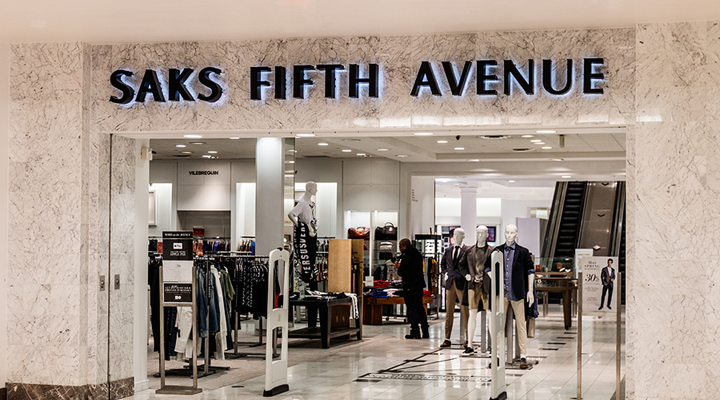The long-anticipated deal between Saks Fifth Avenue and Neiman Marcus could create the ultimate department store behemoth at a time when legacy players are facing increased competition from luxury e-commerce companies and a new generation of high-end brands blending premium products with immersive experiences. Earlier this month, Hudson’s Bay Company (HBC), the parent company of Saks Fifth Avenue, alongside minority investors Amazon and Salesforce, agreed to acquire Neiman Marcus and
The long-anticipated deal between Saks Fifth Avenue and Neiman Marcus could create the ultimate department store behemoth at a time when legacy players are facing increased competition from luxury e-commerce companies and a new generation of high-end brands blending premium products with immersive experiences. Earlier this month, Hudson’s Bay Company (HBC), the parent company of Saks Fifth Avenue, alongside minority investors Amazon and Salesforce, agreed to acquire Neiman Marcus and Bergdorf Goodman in a US$2.65 billion deal. After the deal closes, HBC will establish Saks Global, a combined retail and real estate asset that will include Saks Fifth Avenue, Saks Off 5th, Neiman Marcus and Bergdorf Goodman, each of which will continue operations under their respective brands.Many retail executives and analysts theorise that this move could create the ultimate department store behemoth in the US. “For years, many in the industry have anticipated this transaction and the benefits it would drive for customers, partners and employees,” Richard Baker, HBC’s executive chairman and CEO, acknowledged in a statement announcing the deal. “This is an exciting time in luxury retail, with technological advancements creating new opportunities to redefine the customer experience, and we look forward to unlocking significant value for our customers, brand partners and employees.”What’s been happening within the US department store scene?Marie Driscoll, a chartered financial analyst and a professor at Parsons, The New School and the Fashion Institute of Technology, told Inside Retail that the deal was inevitable considering the current state of US department stores. “The department store channel has been contracting and consolidating for more than 30 years, losing share to off-price, specialty retailers, direct-to-consumer brands and e-commerce retailers,” she said.The average department store shopper, who had shopped with retailers like Bergdorf Goodman and Neiman Marcus in their prime, has aged out of the prime shopping demographic. To attract younger shoppers, another legacy department store, Macy’s, is attempting a 360-degree revitalisation plan.Driscoll noted that the potential launch of Sak Global “is the latest step of this ongoing saga that has resulted in one national department store (Macy’s), and a handful of regional banners (Belks, Bloomingdales, Dillard’s) and follows Macy’s Bold New Chapter strategy announced in February 2024 which includes closing 150 stores through 2026.”Meanwhile, online retail players like e-commerce platform Mytheresa have been gaining an edge with their personal shopping experiences and unique pop-up experiences with engaging, new brands like Flamingo Estate that are capturing the young, wealthy shopper’s attention. Selvane Mohandas du Ménil, the managing director of the International Association of Department Stores, told Inside Retail that the current shakeup in the US department store sector mirrors the 1994 merger of Federated and Macy’s.As a result of the merger, Macy’s was successfully able to nearly quadruple its store count and become the leading player in the department store scene. One key difference with HBC’s proposed acquisition of Neiman Marcus is that the latter’s offering is based on a primarily wholesale business model, whereas Saks Fifth Avenue’s offering relies on a concession-based business model. Ménil explained that this creates a “huge difference in terms of savoir faire”. This is a French term that roughly translates to knowing how to do something. In this case, he said, it applies to the department store’s “relationship with brands, its ability to respond to customer needs and desires, and its ability to bring something new [to the market]”.While the director doesn’t have a “crystal ball” for how the acquisition, once finalised, will pan out, he emphasised the need for department stores to create an efficient ecosystem of online and in-store operations, especially while maximising the usage and value of their flagship stores, to successfully attract customers and convince them to return. Will the deal prove to be successful?Retail experts are on the fence about the benefits of this deal for HBC.Driscoll mused, “One hopes that Saks Global will not result in a blurring of the individual retail banners and a homogenous product offering that would ultimately lead to price competition and erode the profitability of the combined entity.”However, she noted that the influence of one of the deal’s minority investors, Salesforce, may indicate a focus on creating personalised online shopping experiences that will hopefully reduce price competition and aid in Saks Global’s success. Retail analyst and GlobalData managing director Neil Saunders echoed Driscoll, pointing toward the other minority investor, Amazon, as a source for a potential edge in the market. As Saunders explained to Inside Retail, “The real win here would be the ability of Amazon to streamline logistics and e-commerce, giving the new entity an advantage in a market where remote shopping has become more important to shoppers, especially younger ones, which both chains need to do more to attract.”Time will tell how the deal, if finalised, will truly play out in a market that has legacy US department stores struggling to hold on.

